The internet has revolutionized numerous aspects of our lives, and entertainment is no exception. Among the most captivating online activities are games. But what if the concept of “online games” extended far beyond mere entertainment, becoming a framework for understanding modern digital life? This exploration delves into the concept of the “Great Online Game,” a pervasive meta-game played out across the internet, and examines how understanding its rules can unlock real-world opportunities.
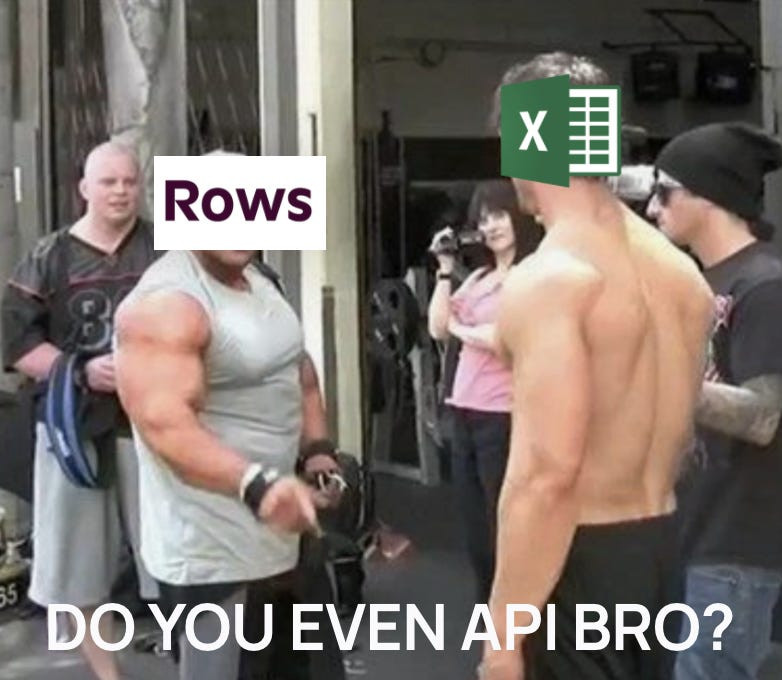 Rows Interface Showcasing Spreadsheet Functionality with API Integrations
Rows Interface Showcasing Spreadsheet Functionality with API Integrations
While the allure of traditional online games like Fortnite or World of Warcraft is undeniable, drawing millions into immersive digital worlds, the “Great Online Game” operates on a different scale. It encompasses social media interactions, professional networking, content creation, and even cryptocurrency engagement. It’s a game where the lines between online and offline blur, and participation can yield tangible rewards in both realms.
Understanding the Great Online Game
Initially, the intention wasn’t to dissect games. The primary question was: why are tech growth stocks underperforming while crypto and value investments surge? The succinct answer: Crypto is inherently more engaging and, frankly, more fun. However, cryptocurrency itself isn’t the ultimate game; it’s merely the currency within a much larger, internet-wide game. This game involves a diverse range of participants – CEOs, influencers, artists, researchers, investors, and everyday individuals – all interacting and competing in the digital sphere. This is the essence of the Great Online Game.
This game is played continuously by billions globally, online, using their real identities, and with real-world implications. While the potential downside is limited, the upside is virtually limitless, impacting both financial and psychological well-being. Social media platforms like Twitter, Reddit, Instagram, TikTok, and Facebook are prime examples of this meta-game in action. Beginner-level participation might seem like simply sharing personal thoughts publicly. Intermediate levels involve mastering engagement tactics. But true mastery transcends mere social media usage; it becomes an ongoing game of strategy and opportunity.
The interconnected nature of the Great Online Game is crucial. Actions in one online area can unlock opportunities in others. Sharing insightful ideas on Twitter might lead to invitations to exclusive Discord communities. Active participation in these communities could open doors to collaborative projects, potentially leading to financial gains or increased online influence. This creates a positive feedback loop, generating more Twitter followers, Discord invites, project opportunities, and innovative ideas, setting off numerous potential pathways.
We are now in an era where typing on a phone or keyboard, speaking into a microphone, or sharing images and videos can mobilize resources, garner support, and unlock opportunities. Cryptocurrency amplifies this potential by integrating game mechanics directly into the internet itself, incorporating points, rewards, digital assets, teams, and more.
The Great Online Game is free to enter and begins with a simple realization: acknowledging that you are already playing. Each tweet, each online interaction, is akin to a free lottery ticket. This understanding is the key to unlocking the game’s potential. Anyone can participate, adapting their gameplay based on their current resources and skills. Leveling up can be rapid, as financial and social capital are no longer solely determined by traditional factors like education, social circles, or hierarchical positions. This game operates on exponential principles, offering unique pathways to success.
To fully grasp the mechanics and strategies of this game, we need to explore several key aspects:
- Defining a Video Game: Understanding the core elements of game design.
- The Essence of the Great Online Game: Delving deeper into its characteristics and scope.
- Identifying the Players: Recognizing the diverse participants and their roles.
- The Role of Crypto: Examining how cryptocurrency enhances and fuels the game.
- Strategies for Playing: Providing actionable advice on how to engage and thrive in this game.
Before outlining strategies for success, it’s essential to first establish a foundational understanding of what constitutes a video game and how the Great Online Game mirrors these principles.
What Defines a Video Game?
Imagine a typical Monday morning. Fatigue sets in, work looms, and a pending assignment, procrastinated over the weekend, demands immediate attention. This hardly feels like a game.
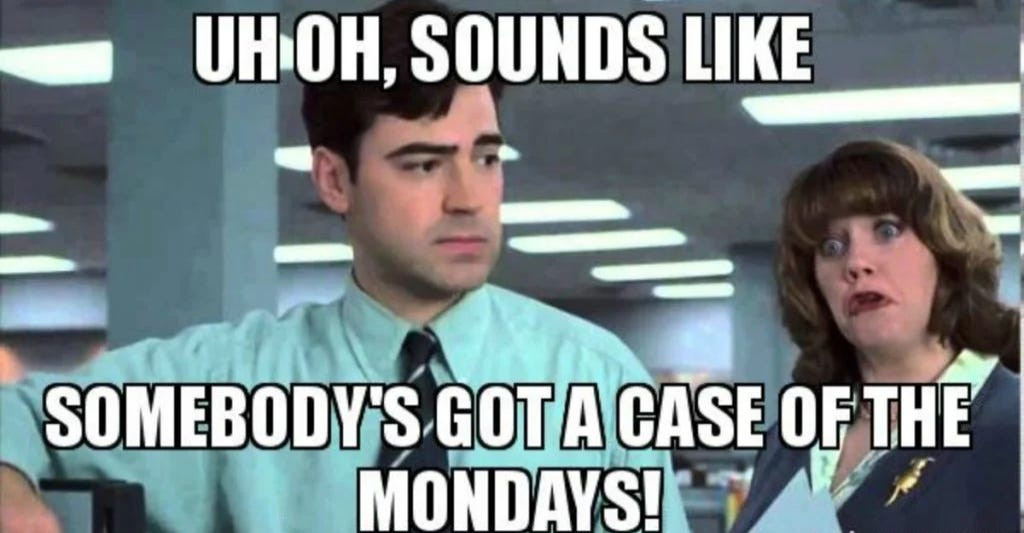 Depiction of Overwhelmed Person at Desk with Multiple Screens
Depiction of Overwhelmed Person at Desk with Multiple Screens
However, even these mundane tasks can be viewed through a gamified lens. Drawing from the Oxford English Dictionary, a video game is defined as “A game played by electronically manipulating images produced by a computer program on a television screen or other display screen.” If you’re working remotely on a computer, you’re technically engaged in activities that align with this definition.
 Tweet by Nik Milanovic on Keyboard Keys and Buying a House
Tweet by Nik Milanovic on Keyboard Keys and Buying a House
As Nik Milanovic aptly put it, “Sometimes it’s weird to remember that we’re all effectively competing to hit the right keys on our keyboards in the right order, and that if we do it for long enough we can buy a house.” Success in the modern workplace often boils down to effectively interacting with digital interfaces. Work, in this context, can be seen as a sometimes tedious sub-game within the larger meta-game of online life.
But this is a literal and somewhat simplistic interpretation. To delve deeper, consider the characteristics of truly engaging games. According to Josh Buckley, a gaming entrepreneur and investor, the best games “create spaces that bring you into flow.” He argues that platforms like Twitter, Facebook, and Instagram are essentially games with billions of active players, functioning as sophisticated slot machines.
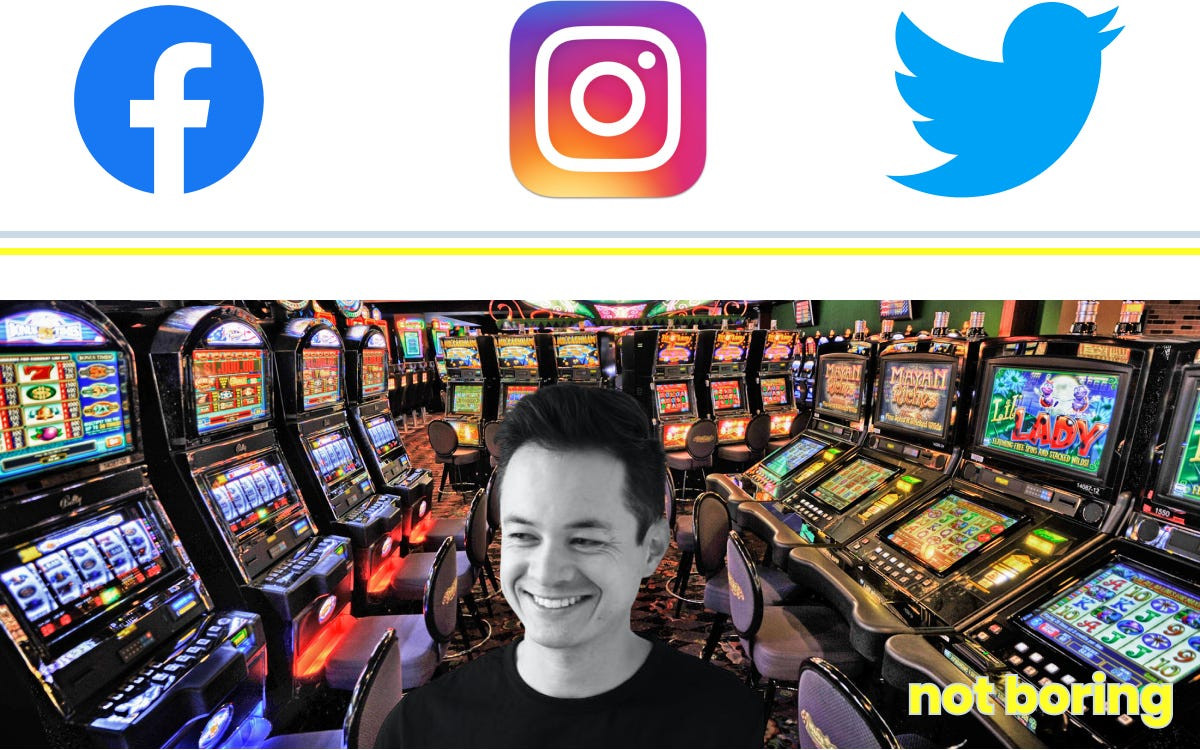 Image of Social Media Icons as Slot Machine Reels
Image of Social Media Icons as Slot Machine Reels
Buckley identifies four crucial elements of successful game design, all of which are present in the Great Online Game:
- Frequent Feedback Loops: Consistent and timely responses to player actions.
- Variable Outcomes: Unpredictability and diverse results keep players engaged.
- Sense of Control: Players feel their actions have a direct impact on the game.
- Connection to a Meta-Game: The game is linked to a broader context, providing deeper meaning and motivation.
The connection to a meta-game is particularly significant in the Great Online Game, as it ties online activities to real-world consequences and opportunities.
The Expansive Realm of the Great Online Game
“The internet is incredible,” is a common refrain among those who have mastered the Great Online Game. Even as this is being written, Blake Robbins tweeted:
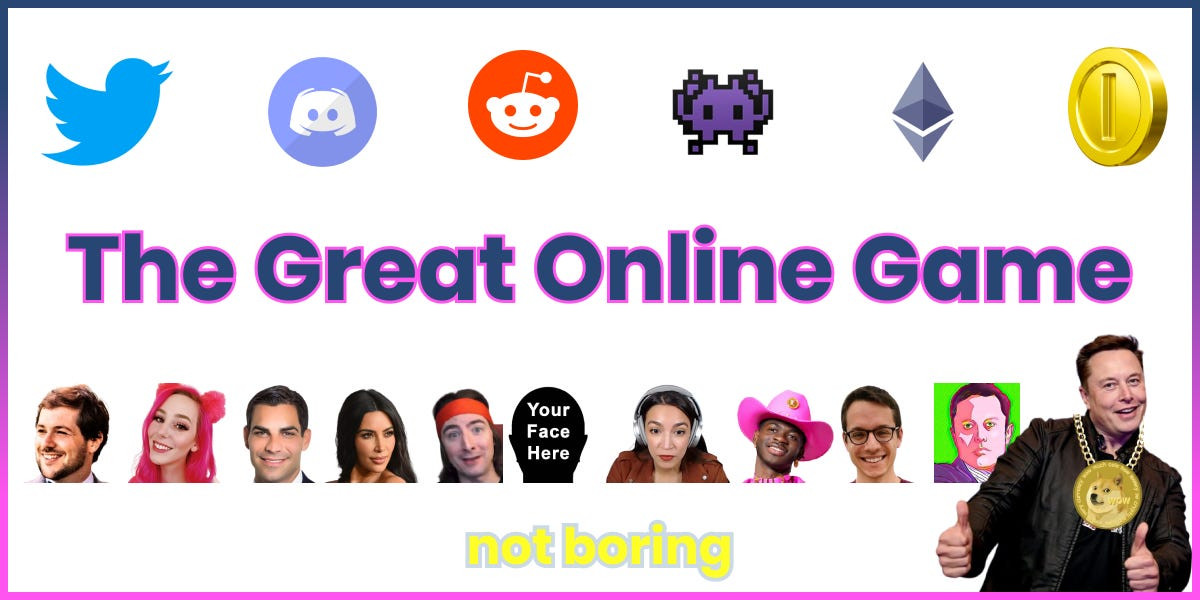 Tweet by Blake Robbins on the Power of the Internet and Twitter
Tweet by Blake Robbins on the Power of the Internet and Twitter
Mastering the Great Online Game can lead to seemingly improbable outcomes. Industry leaders might appear in your direct messages, admired content creators might propose collaborations, and dream job opportunities could materialize unexpectedly. Blake Robbins himself transformed his active online presence into a successful venture capital career at Ludlow Ventures, becoming a respected voice on creators, gaming, and future internet trends.
 Tweet by Blake Robbins on Infinite Games and Rabbit Holes
Tweet by Blake Robbins on Infinite Games and Rabbit Holes
Blake’s approach embodies an infinite game, characterized by continuous exploration, learning, helping others, and building connections. James Carse, who coined the term “infinite game,” described it as an ongoing interaction that “changes rules, plays with boundaries and exists solely for the purpose of continuing the game.” Unlike finite games focused on winning, infinite games are about sustained participation and evolution.
The Great Online Game is precisely this: an infinite video game unfolding across the internet. It utilizes video game mechanics but transcends traditional boundaries. Players participate as themselves, not as avatars in virtual worlds. They accumulate points, skills, and attributes applicable to both their digital and physical lives. Pseudonymous players can even leverage their online prowess to secure jobs and financial rewards.
This game values community and collaboration over individualistic competition. Contributing through curiosity, sharing, and helping others, without expecting immediate reciprocation, earns points. By expanding your online presence, you increase your chances of serendipitous encounters. For those who engage authentically and positively, the Great Online Game offers immense potential with minimal downside. Anyone, regardless of their background, can join the Great Online Game and contribute to building their desired world.
Meet the Key Players in the Online Arena
Elon Musk’s public persona and career trajectory perfectly exemplify mastery of the Great Online Game. His ventures like Tesla, SpaceX, and Starlink push the boundaries of what’s considered possible, while his online behavior often defies conventional norms.
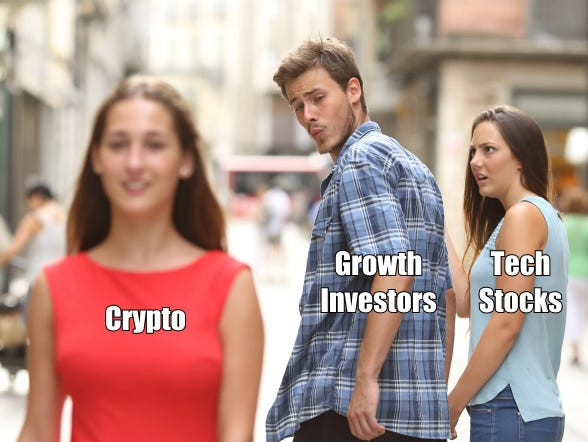 Tweet by Elon Musk on Taking Tesla Private at 0
Tweet by Elon Musk on Taking Tesla Private at 0
Musk operates on an advanced level, building tangible entities while seemingly bending the rules of the game. But success in the Great Online Game doesn’t require building rockets or amassing vast fortunes. Consider Bored Elon Musk, a pseudonymous Twitter account with 1.7 million followers, known for tweeting humorous, Elon-inspired invention ideas. This account generated $1 million in NFT sales within a month, demonstrating the financial potential even for anonymous players.
Alex Danco’s journey further illustrates the diverse paths within the Great Online Game. He built “Dancoland,” an online world centered around his newsletter, mapping his progression through various online landscapes, from startup analysis to broader cultural and intellectual explorations.
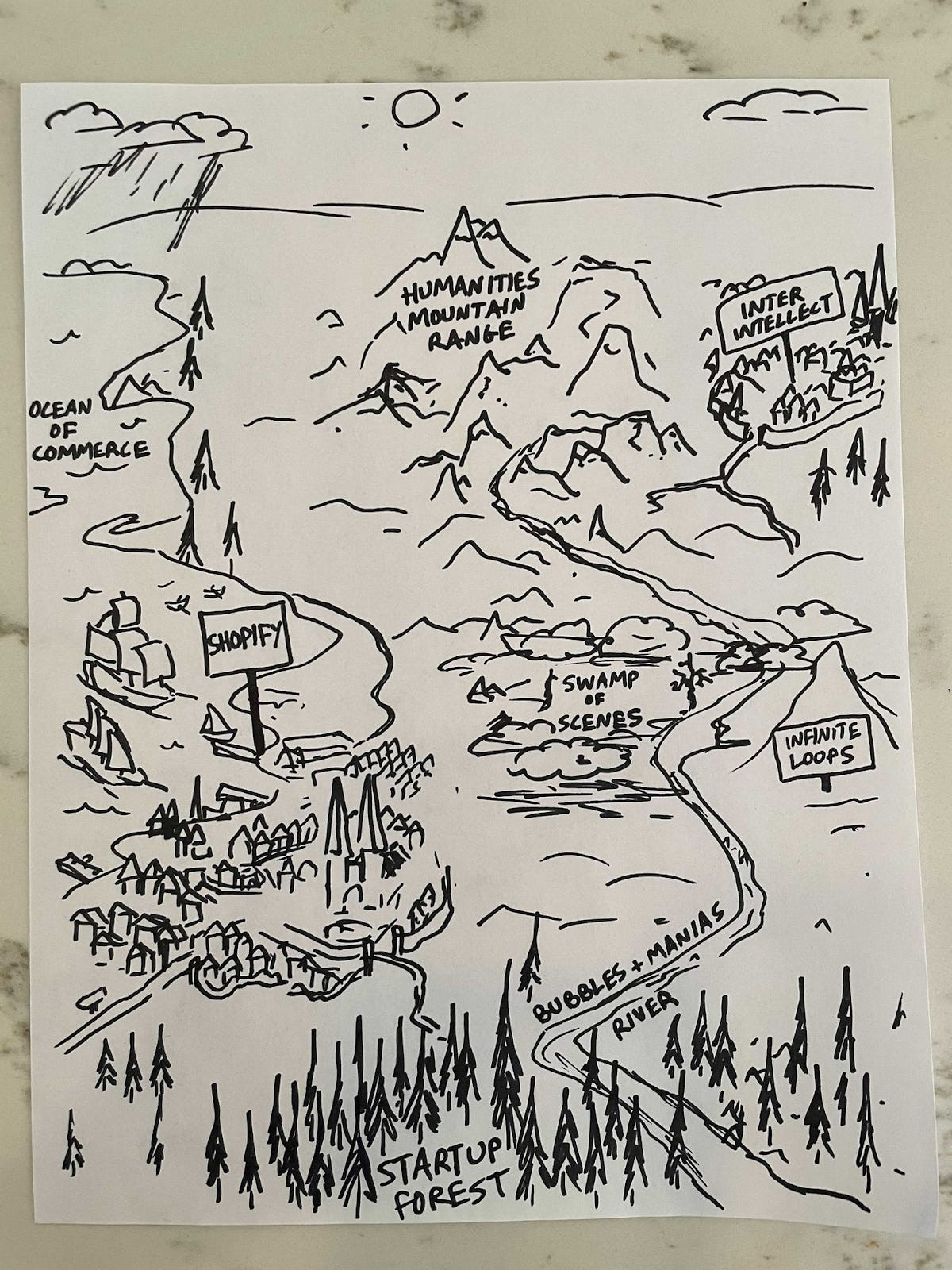 Alex Danco's Map of Dancoland and His Online Journey
Alex Danco's Map of Dancoland and His Online Journey
His online writing and engagement opened doors to new connections, ideas, and ultimately, a dream job at Shopify. However, Danco continues to play, expanding his online world through podcasts and community involvement, demonstrating the ongoing nature of the game.
Megan Leeds, known as MeganPlays, exemplifies how online gaming itself can be a launching pad for broader success in the Great Online Game. Starting with YouTube videos of playing The Sims, she expanded into Roblox content, game development, and online merchandise, building a multi-million dollar enterprise.
 Tweet Highlighting Megan Leeds' Gaming Success and Studio
Tweet Highlighting Megan Leeds' Gaming Success and Studio
Her success story underscores a key principle of the Great Online Game: “There’s nothing I’ve done that anybody else can’t do. It’s about learning—learning the code, learning how the game works, & creating. All you have to do is start.“
Lil Nas X’s rise to fame also showcases the power of online game mastery. Starting with internet memes and social media engagement, he leveraged platforms like Twitter to cultivate a massive online following.
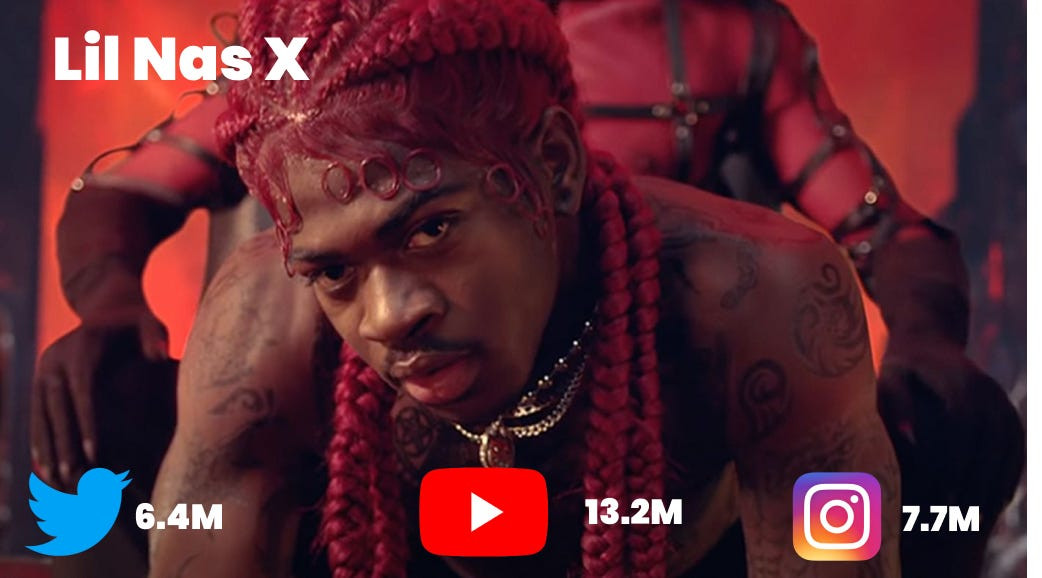 Image of Lil Nas X Performing on Stage
Image of Lil Nas X Performing on Stage
His online savvy propelled his music career, culminating in global hits and significant cultural impact. Lil Nas X’s continued use of social media as a meme-lord reinforces the ongoing nature of the Great Online Game.
These examples, alongside figures like Kim Kardashian, Donald Glover, and countless others, demonstrate the diverse ways individuals are leveraging the Great Online Game for varied forms of success. Miami Mayor Francis Suarez’s embrace of the tech community through Twitter further illustrates how even cities can participate and benefit from this game.
 Tweet by Blake Robbins on the Power of the Internet and Twitter
Tweet by Blake Robbins on the Power of the Internet and Twitter
The rise of cryptocurrency has further intensified the Great Online Game, creating new millionaires and billionaires who built their wealth through online communities, crypto knowledge, and strategic participation. Even those who simply observe and learn within these online spaces are actively participating in the game.
Cryptocurrency: The In-Game Currency of the Internet
Cryptocurrency enthusiasts often intuitively understand the gamified nature of the online world. Within the crypto space, memes can drive market movements and create substantial wealth, highlighting the power of online culture and community.
More fundamentally, cryptocurrency functions as the in-game currency for the internet, directly rewarding participation. Early adopters, supporters, developers, and community members are often incentivized with tokens. Social tokens, in this context, become points that reward positive gameplay across the internet, incentivizing followers to support and engage with communities and projects.
Cryptocurrency also facilitates direct value exchange between players. The emergence of NFTs (Non-Fungible Tokens) exemplifies this, enabling creators to directly monetize digital assets. NFTs can be viewed as digital “skins,” art, or assets within the Great Online Game, allowing players to express their identity and status within the digital realm.
 Slide from Mirror's Presentation on NFTs as Digital Expression
Slide from Mirror's Presentation on NFTs as Digital Expression
DAOs (Decentralized Autonomous Organizations) are also becoming crucial infrastructure for the Great Online Game. They enable fluid participation in projects and communities, allowing individuals to contribute and collaborate dynamically, forming lightweight, temporary groups to achieve shared goals.
The tools and infrastructure supporting the Great Online Game are still evolving, with web3 projects continually enhancing its capabilities. The game is becoming increasingly compelling, and we are still in its early stages.
Strategies for Playing and Thriving in the Great Online Game
As Harley Finkelstein, President of Shopify, noted, “The cost of failure is as close to zero as it’s ever been in the history of the world.” This sentiment is particularly true for the Great Online Game. Participation is about building optionality and exploring potential pathways, rather than solely focusing on immediate business ventures.
Anyone can engage in the Great Online Game, requiring only curiosity and a willingness to learn. A common entry point is joining a niche online community aligned with your interests. Thoughtfully engaging with respected individuals on platforms like Twitter or participating in relevant Discord communities are effective starting points. Identify your “nerdiest” interests and seek out like-minded individuals online.
Over time, transition from passive consumption to active creation. Share your thoughts through writing, videos, discussions, projects, or simply document your journey as a new player. Authenticity is key. Embrace your unique character attributes, whether you are a generalist or a specialist. Experiment fearlessly, treating online interactions as part of a game. The worst outcome is being ignored; the best is unlocking unforeseen opportunities.
Once engaged, focus on Buckley’s four elements of game design:
- Feedback Loops: Actively seek and analyze feedback from your online interactions. Pay attention to what resonates and what doesn’t, but avoid being overly calculated. Authentic engagement is more valuable than chasing metrics.
- Variable Outcomes: Embrace experimentation and accept that some endeavors will succeed while others may not. View failures as learning opportunities within the game.
- Sense of Control: Recognize that effort and skill directly influence outcomes in the Great Online Game. Focus on deepening your knowledge and skills in areas you are passionate about. Provide value to the community without expecting immediate returns, and prioritize continuous learning.
- Connection to the Meta-Game: Understand that your online activities are intrinsically linked to your real-life trajectory. Leveling up in the Great Online Game translates to expanded opportunities in your career and life.
The Great Online Game, when played effectively, can be genuinely enjoyable. Approach it with a playful mindset, without excessive seriousness. You don’t need to abandon your current career to participate. Engage on the side, cultivate new hobbies and relationships, and build a safety net and potential supercharger for your existing endeavors. The long-term benefits and unexpected pathways are often the most rewarding aspects of participation.
Important Reminder: Maintain ethical online conduct. Being aggressive or disrespectful might attract initial attention, but it ultimately undermines long-term success in the Great Online Game.
Personal experiences, like starting a newsletter out of boredom, can unexpectedly evolve into full-fledged engagement in the Great Online Game. Embrace the journey, explore your interests, and enjoy the process of opening doors you never knew existed. Playing the Game is about having fun and unlocking exponential, compounding returns in both your online and offline life. So, dive in and start playing.

